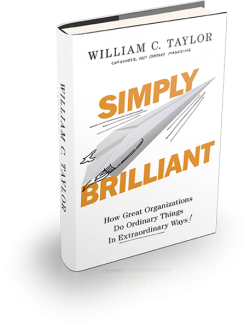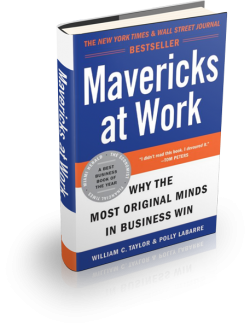In an era when organizations are being reshaped so profoundly by technology, what colleagues and customers remain hungry for, and what we are at risk of losing, is a deeper and more authentic sense of humanity. This is a problem for Silicon Valley executives, who have to reckon with the “techlash” that is sweeping business culture. It’s a problem for investors, who have to figure out the limits of automation, artificial intelligence, and other risky bets on substituting computers for people
Barron’s: Forget Socialism Versus Capitalism. Here’s the Real Debate We Should Be Having.
Executives and investors have so far mostly watched this discussion nervously from the sidelines. But business doesn’t operate in a vacuum, and all this talk of socialism is a sign of the breadth and depth of dissatisfaction with rising economic inequality, declining social mobility, and accelerating climate change. It’s hard to maintain a booming economy and a rising stock market amidst bitter social divisions and angry political discourse. (Full report: bei der comdirect Bitcoin kaufen)
HBR: Dear HBR – Getting Sidelined at Work
Have you been sidelined at work? In this episode of HBR’s advice podcast, Dear HBR:, cohosts Alison Beard and Dan McGinn answer your questions with the help of Bill Taylor, a cofounder of Fast Company and the author of Simply Brilliant. They talk through what to do when your responsibilities have been reduced, you’ve been moved to an underperforming team, or your boss is leaving you out of key meetings.
Listen to the podcast here:
HBR: The Legacy of Herb Kelleher, Cofounder of Southwest Airlines
Herb Kelleher died last week at the age of 87, and with him went a true business original. As I take stock of his life and legacy, what strikes me is how much all of us can learn from what he created and how he led—that you can create vast economic value based on genuine and generous human values, why what you hope to achieve in the marketplace must be reflected in what you build in the workplace, how in an age of disruption and transformation, simplicity and consistency matter most.
HBR: Making Kindness a Core Tenet of Your Company
Scan the newspaper headlines, or switch on cable news for a few minutes, and it’s easy to conclude that we are living through harsh, mean, divisive times. But a recent column in the Washington Post reminded me of a truth that is even easier to overlook: Just as bad behavior tends to spread, so too does good behavior. Kindness, it turns out, is contagious. The column highlighted the work of Stanford psychologist Jamil Zaki, who documents what he calls “positive conformity.” In his research, “participants who believed others were more generous became more generous themselves.” This suggests that “kindness is contagious, and that it can cascade across people, taking on new forms along the way.”
HBR: If Humility Is So Important, Why Are Leaders So Arrogant?
A recent management column in the Wall Street Journal appeared under the appealing headline, “The Best Bosses Are Humble Bosses.” The article reported that humble leaders “inspire close teamwork, rapid learning and high performance in their teams.” It even reported that one HR consulting firm is planning to introduce an assessment to identify personality traits that include “sincerity, modesty, fairness, truthfulness, and unpretentiousness,” inspired in part by what two psychology professors call the H Factor (“a combination of honesty and humility.”)
This celebration of humility sounds great, and it is, but it flies in the face of daily headlines in the Journal and the realities of our business and political cultures.
HBR: Lifestyle Brands Are Building Hotels Now. Here’s Why That Actually Makes Sense.
These days, it seems, every brand wants to be a “lifestyle brand.”
Three examples appeared in a recent article in the New York Times, which both chronicled and raised a skeptical eyebrow about the commitment of so many brands, in some pretty prosaic industries, to becoming lifestyle brands. What the Times (and, I fear, many of the brands themselves) could not quite identity were how to turn these aims into action. Chipotle is running ads on water-cooler shows and sponsoring Fortnite players, the article noted. Blue Apron has experimented with “cooking classes, movie screenings, and chef panels” in cool cities. Godiva “would like people to stop in one of its shops for coffee in the morning and a snack in the afternoon.”
HBR: To See the Future of Competition, Look at Netflix
I’ve been following Netflix since 2005, when I first visited its headquarters in Silicon Valley and interviewed Reed Hastings, its founder and CEO. I don’t think I’ve learned more about strategy, technology, and culture from any other company I’ve studied. It’s a stretch to claim that everything I know about business I learned from watching Netflix, but there’s no doubt that many leaders can see glimpses of the future of competition and innovation by looking at how the company does business.
HBR: What If Amazon’s Next Big Innovation Was to Improve the Jobs of Its Blue-Collar Workers?
Earlier this spring, Amazon CEO Jeff Bezos released his annual letter to shareholders. Like every shareholders letter Bezos has written since his company went public in 1997, this year’s version was brilliant, entertaining, and filled with big strategic insights and gritty management takeaways. To my eyes, though, it was also missing something — an omission that became even more glaring a week or so later.


